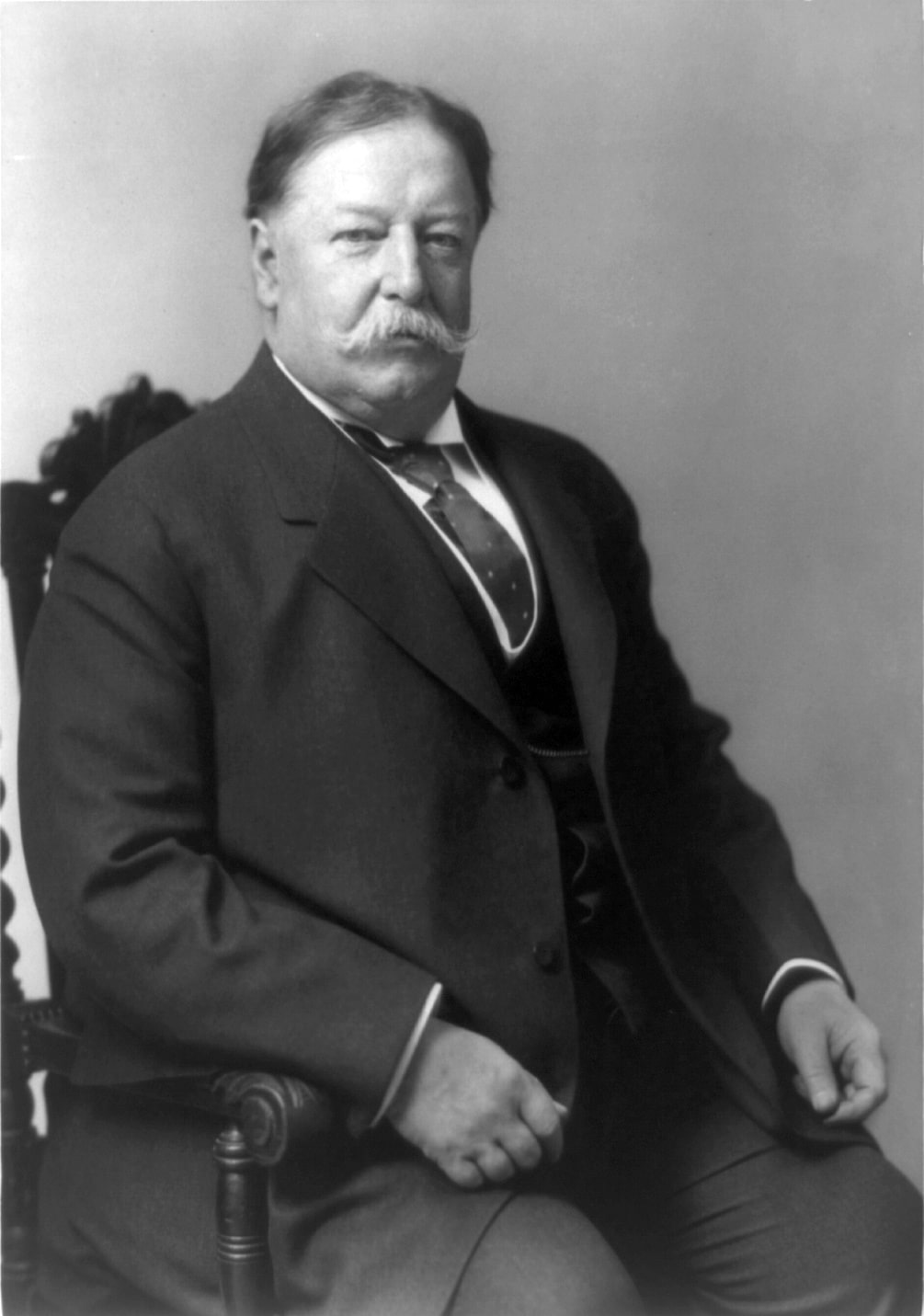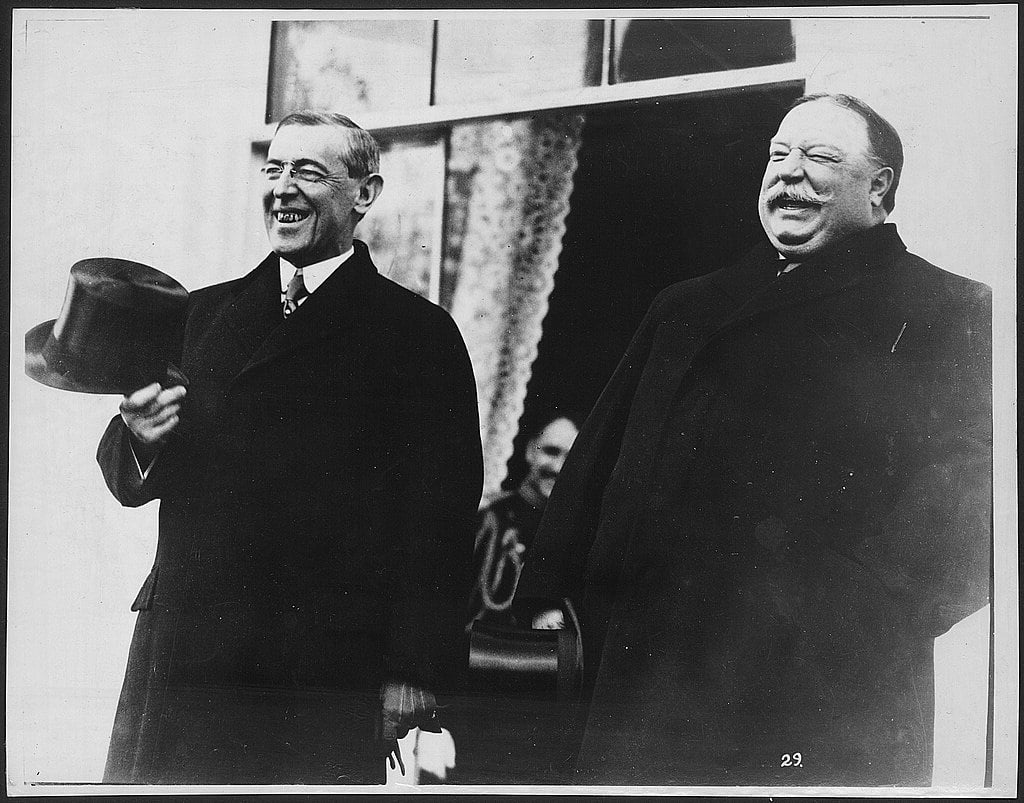President William Taft was the protege of former President Theodore Roosevelt and the 27th President of the United States of America after winning the election of 1908.

Taft was an interesting figure in American history. he was known for his legal mind and his physical weight. He was the fattest president that ever served in the Oval Office and needed a larger bathtub. He would also become the only president to serve as a Justice of the Supreme Court.
However, his presidency would be marked with disappointment as it divided the Republican party and would lead to the election of Woodrow Wilson in the election of 1912.
Jump to:
Taft's Term
March 4, 1909: William Howard Taft is inaugurated as the next president. In his inauguration, he promises to continue the legacy of Theodore Roosevelt.
March 15, 1909: Congress meets to revise tariffs.
May 17, 1909: President William Taft's wife suffers a stroke, which leaves her speech impaired. It takes Mrs. Taft a year to recover.
June 16, 1909: Taft proposes a Corporate Income Tax and calls for a Constitutional amendment to allow the federal government to collect personal income taxes as well.
July 12, 1909: Congress passes the 16th Amendment, which allows the federal government to collect income taxes.
July 15, 1909: President William Taft talks with China about allowing American businessmen to invest in a railroad throughout the country of China. It takes time, but China eventually agrees.
August 6, 1909: Taft signs the Payne-Aldrich Tariff Act, which lowers tariffs on a few items. However, the tariffs that were lowered were minuscule, and it disappoints many Republicans who wanted lower tariffs in order to keep the price of goods down.
November 13, 1909: The Alaskan Coal Field Controversy begins. The controversy would eventually lead to the dismissal of cabinet members and hurt the reputation of the Taft administration.
March 26, 1910: Congress amends the Immigration Act of 1907, which bans criminals, anarchists, and others from migrating to the United States.
May 31, 1910: Taft prevents Western railroads from raising freight rates.
June 25, 1910: Taft signs the Postal Savings Bank Act. The new law allows one bank in each state to offer two percent interest on bank accounts containing less than $500. Congress also passed the Mann Act, also referred to as the "White Slave Traffic Act," which prohibits the transport of women for "immoral purposes." It also places telephone, cable, and wireless companies under the jurisdiction of the Interstate Commerce Commission and allows Congress to suspend new shipping rates.
August 31, 1910: Former President Theodore Roosevelt delivers a speech in Osawatomie, Kansas, that talks about a "New Nationalism." President William Taft distances himself from Roosevelt's speech due to he believed it to be unconstitutional. This would hurt the two's relationship.
September 5, 1910: President Taft declines a dinner invitation given by the National Conservation Congress in honor of him and Roosevelt. This continues to increase the divide between the two.
November 8, 1910: Democrats take control of the House of Representatives for the first time since 1894.
January 21, 1911: Senator Robert Lafollette of Wisconsin establishes the National Progressive Republican League.
March 7, 1911: President William Taft sends 20,000 American Troops to the border of Mexico to protect Americans. Tensions between the United States and Mexico escalate.
March 25, 1911: Building codes in New York are revised after 146 female workers died in a fire when the exit doors were blocked.
May 15, 1911: John D. Rockefeller is found to be in violation of the Sherman Anti-Trust Act by the Supreme Court.
May 16, 1911: President Porfirio Diaz of Mexico resigns and is replaced by Francisco Madero, a reformer and revolutionary.
June 6, 1911: The United States signs a treaty at the Knox-Castrillo Convention with Nicaragua.
July 26, 1911: President William Taft signs the Canadian Tariff Reciprocity Agreement that lowers tariffs on many farm imports from Canada in exchange for lower rates on American goods going to Canada.
August 17, 1911: Taft vetoes tariff reductions on wool and woolen goods. This causes much criticism from Republicans who say Taft had abandoned the party's principles.
October 26, 1911: Roosevelt and Taft's friendship ends when Taft sues U.S. Steel for violating the Sherman Anti-Trust Act, claiming that Roosevelt had mistakenly allowed them to purchase the Tennessee Coal and Iron Company.
January 6, 1912: New Mexico is admitted to the Union.
January 17, 1912: President William Taft recommends that the federal government begin adopting an Annual Federal Budget.
February 14, 1912: Arizona is admitted to the Union as the 48th state. This would be the last state to be admitted that was connected to the original country. Alaska and Hawai'i would be admitted later. Alaska was separated from the United States by Canada, and Hawai'i was in the middle of the Pacific Ocean.
February 22, 1912: Theodore Roosevelt announces that he plans to run for the Republican nomination against Taft.
April 9, 1912: President William Taft authorizes the creation of the Children's Bureau.
June 5, 1912: American Marines Land in Cuba to ensure order under the 1903 Platt Amendment, which barred Cuba from relinquishing control to a foreign power.
June 19, 1912: Congress passes labor law authorizing an Eight-Hour Work Day for all workers with federal contracts.
June 18 - 22, 1912: Taft defeats Roosevelt to win the Republican nomination for President.
June 25 - July 2, 1912: Democrats nominate Woodrow Wilson for president.
August 2, 1912: A group of Japanese investors attempts to purchase land in Magdalena Bay in the Gulf of California. The action is seen as a violation of the Monroe Doctrine.
August 5, 1912: Theodore Roosevelt is nominated for president by the Progressive Party, also known as the Bull Moose Party. This nomination effectively splits the Republican party for the upcoming election.

August 24, 1912: The Panama Canal Act is passed and exempts the United States from paying tolls when passing through the canal.
October 30, 1912: Vice President John Sherman dies. Taft chooses Nicholas Butler as his new running mate.
November 5, 1912: Woodrow Wilson defeats President William Taft to win the presidency.
February 18, 1913: General Victoriano Huerta overthrows Madero in Mexico.
February 25, 1913: The 16th Amendment is ratified by the states.
March 1, 1913: The Webb-Kenyon Interstate Liquor Act is passed, which prohibits the shipment of liquor into "dry" states.
March 4, 1913: Congress divides the Department of Labor and Commerce into two separate Cabinet-level departments.
